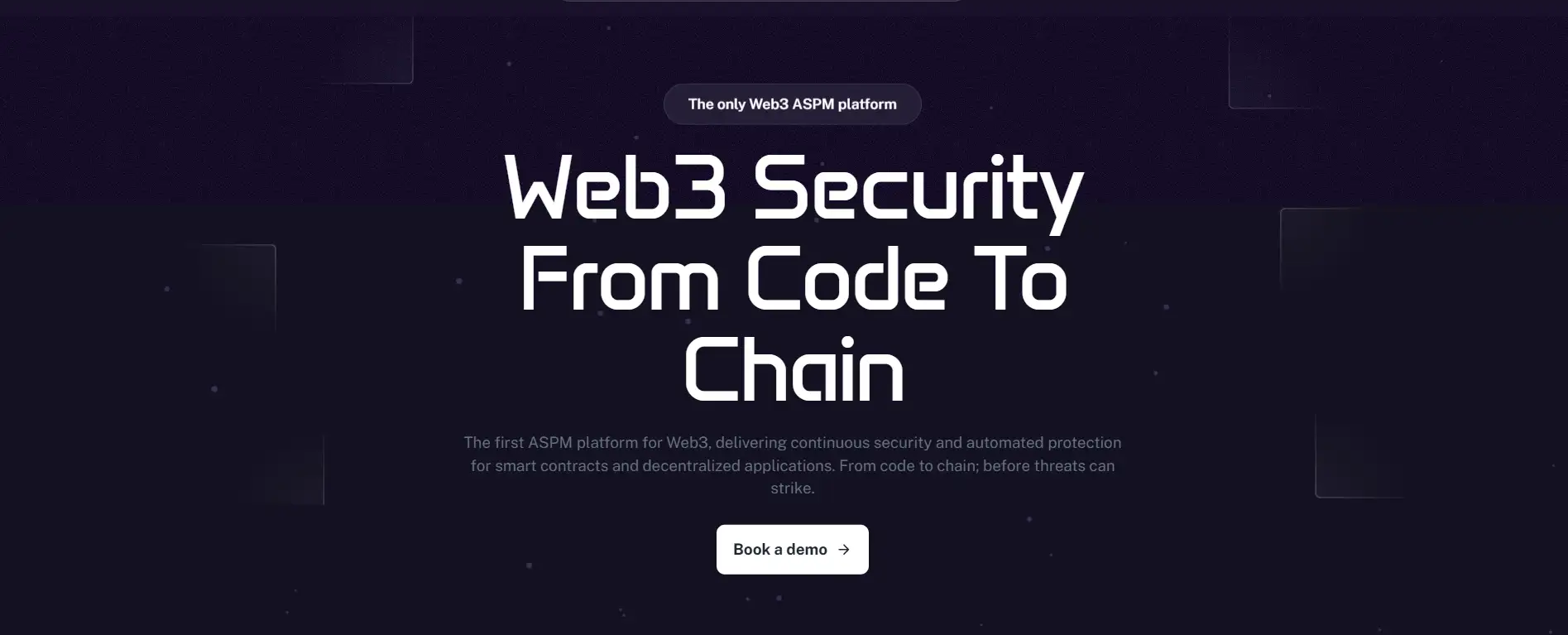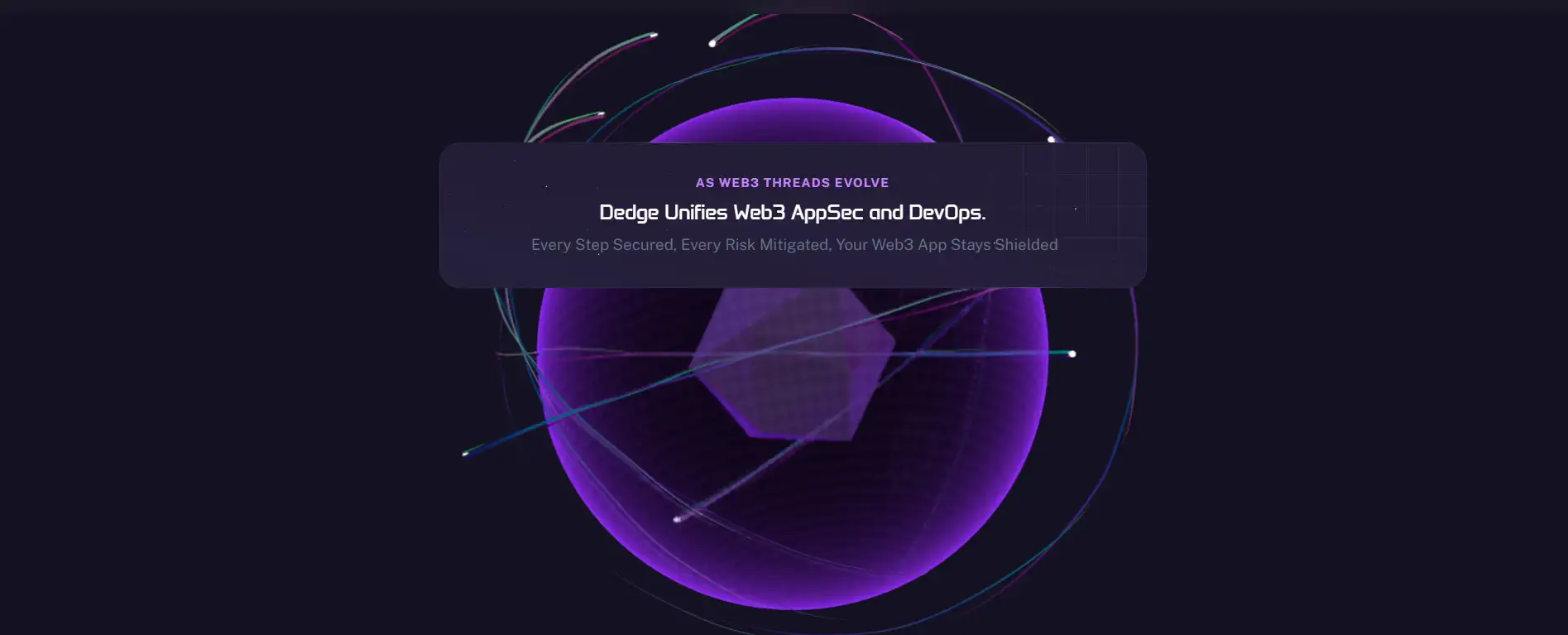About Dedge Security
Dedge Security is an advanced cybersecurity platform purpose-built to defend the Web3 ecosystem from evolving digital threats. As the first Web3 ASPM (Application Security Posture Management) platform, Dedge Security delivers end-to-end security across the development lifecycle—from writing code to deploying on-chain. By unifying DevSecOps with decentralized app security, Dedge offers a powerful framework for securing smart contracts, nodes, dApps, and the entire blockchain infrastructure.
Created by cybersecurity veterans, the platform combines real-time monitoring, AI-driven detection, and seamless CI/CD integration to provide automated protection and actionable insights. Backed by a €4 million seed round, Dedge is actively scaling its mission to proactively secure Web3 environments and eliminate reliance on outdated Web2 security tools. With its strong foundation in software security and blockchain expertise, Dedge Security is reshaping the future of digital trust in decentralized systems.
Dedge Security was developed in response to the growing security gap between traditional cybersecurity tools and the decentralized requirements of the Web3 landscape. Founded by the experienced team behind Randed (acquired by Netskope), Dedge combines deep cybersecurity knowledge with blockchain innovation. The platform was designed to secure not just smart contracts, but the entire development and operational pipeline in Web3, addressing risks at every layer—code, cloud, infrastructure, and on-chain deployments.
At its core, Dedge provides a fully integrated ASPM platform for Web3, enabling continuous code analysis, smart contract monitoring, and infrastructure visibility. Unlike typical audit-first approaches, Dedge offers real-time risk detection with over 160+ smart contract vulnerability detectors, LLM integration for AI analysis, and tools to monitor smart contract upgrades, validator nodes, and RPC configurations. This proactive model significantly reduces dependency on one-time audits by embedding security into development workflows.
Key innovations include CI/CD-embedded security, automated misconfiguration detection, and real-time threat response. Teams can integrate Dedge into their DevOps environment to secure code before deployment and continue monitoring applications after going live. The platform also supports integration with tools like Jira, Slack, and OpsGenie, allowing enterprises to manage incidents and vulnerabilities collaboratively and efficiently.
Dedge's modular approach ensures that organizations can "Build Securely" and "Operate Safely" with unified visibility and control across their stack. Its supply chain risk assessment capabilities help detect dependency issues and third-party risks early. By centralizing risk prioritization, correlating vulnerabilities, and providing actionable remediation guidance, Dedge ensures developers can move fast without compromising on security.
Dedge competes in a growing field of blockchain security platforms but stands out due to its ASPM-first approach. Key alternatives include OpenZeppelin (audit-focused), Consensys Diligence (manual audit and security tooling), and Immunefi (bug bounty platform). While these focus on specific segments, Dedge uniquely offers continuous, integrated protection from development through deployment and operations.
Dedge Security provides numerous benefits and features that make it a standout platform in the Web3 cybersecurity ecosystem:
- First Web3 ASPM Platform: A comprehensive solution offering continuous application security posture management across code, infrastructure, and smart contracts.
- Continuous Code Security: Reduces reliance on manual audits by embedding automated vulnerability scanning into the CI/CD process.
- AI-Driven Threat Detection: Uses large language models (LLMs) to detect unusual transaction patterns and identify anomalies in real time.
- Smart Contract Upgrade Monitoring: Tracks changes in deployed contracts to detect unauthorized logic modifications and potential exploits.
- Comprehensive Node & Infrastructure Monitoring: Ensures node availability, performance, and synchronization are continuously tracked to avoid operational risks.
- Web3 Supply Chain Security: Identifies vulnerabilities in third-party libraries, validators, and configurations before deployment.
- Enterprise Tool Integration: Seamlessly connects with Jira, Slack, OpsGenie, and more to enhance collaboration and incident response across teams.
- Rule-Based Incident Response: Automates contract pausing and threat mitigation based on real-time alerts and security rules.
Dedge Security offers a streamlined onboarding experience designed to help developers and enterprises secure their Web3 applications quickly and efficiently:
- Visit the Official Website: Navigate to https://dedgesecurity.com to learn more about the platform’s capabilities.
- Book a Demo: Click the “Book a Demo” button available on the homepage to schedule a walkthrough with the Dedge team.
- Platform Access: After your demo or inquiry, Dedge will provide access to its platform for eligible enterprise or dev teams. From there, you can begin integrating it into your workflows.
- CI/CD Integration: Incorporate Dedge into your existing development pipeline. It supports major CI/CD tools and automates security checks during each push or pull request.
- Configure Security Modules: Activate modules like smart contract analysis, infrastructure monitoring, threat detection, and rule-based incident management.
- Enable Monitoring & Alerts: Set up real-time alerts and integrate with services like Slack or Jira to ensure your team stays updated on potential risks.
- Review Documentation: Dedge provides detailed onboarding guides and support through its expert team. All modules are supported with technical documentation and setup assistance.
- Contact Support: Reach out to the Dedge team anytime at [email protected] for personalized help or troubleshooting.
Dedge Security FAQ
Dedge Security uses its Smart Contract Visibility & Upgrade Monitoring feature to track deployed contract changes across networks. This includes monitoring for unauthorized modifications, logic updates, or unexpected deployment activity. By maintaining a historical link between source code and on-chain instances, Dedge ensures teams are alerted the moment any suspicious upgrade is detected.
Web3 ASPM stands for Application Security Posture Management, tailored for decentralized environments. Dedge Security is the first platform to bring this concept to Web3 by embedding security policies, real-time code analysis, and threat detection directly into the dApp lifecycle. This approach gives Dedge full-stack coverage, from initial development to post-deployment monitoring.
Dedge applies AI-driven threat detection to monitor nodes, smart contracts, and infrastructure. It analyzes transaction patterns, performance anomalies, and sync statuses to flag risks before they escalate. Customizable rule-based triggers allow Dedge to automate actions like pausing contracts or alerting teams the moment a critical event is detected.
Dedge Security is designed to seamlessly embed into CI/CD pipelines. It scans every pull request, commit, and build with automated analysis, integrating effortlessly with platforms like GitHub and GitLab. This enables developers to maintain their existing workflows while Dedge provides non-intrusive yet powerful security enforcement in the background.
Dedge addresses the Web3 supply chain attack vector by scanning external libraries, third-party audits, and node configurations. It runs Web3 SCA (Software Composition Analysis) and W3IaC scans to detect hidden vulnerabilities and dependency risks across the stack. Through this multi-layered approach, Dedge secures both code and infrastructure pre- and post-deployment.
You Might Also Like












